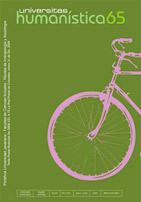Resumen
La tesis que se presenta en este trabajo es que la experiencia traumática del desplazamiento conduce a quien la padece a actuar dentro de una estructura socio-cultural que degrada su identidad y lo obliga a responder con el ocultamiento, la oscuridad, el silencio o el desvio. Para demostrar lo afirmado, desarrollamos en este escrito cuatro aspectos. En el primero, presentamos algunos elementos relacionados con la historia de la visibilización del desplazamiento forzado en el contexto colombiano. En el segundo, realizamos una aproximación a los rasgos básicos del concepto de desplazamiento. En el tercero, señalamos las transformaciones del sentido del desplazamiento forzado. Y en el cuarto, por último, concluimos señalando algunas de las condiciones generales para la reconciliación, el perdón y la esperanza. 
La revista Universitas Humanística se encuentra registrada bajo la licencia Creative Commons Reconocimiento 4.0 Internacional. Por lo tanto, esta obra se puede reproducir, distribuir y comunicar públicamente en formato digital, siempre que se reconozca el nombre de los autores y a la Pontificia Universidad Javeriana. Se permite citar, adaptar, transformar, autoarchivar, republicar y crear a partir del material, para cualquier finalidad (incluso comercial), siempre que se reconozca adecuadamente la autoría, se proporcione un enlace a la obra original y se indique si se han realizado cambios. La Pontificia Universidad Javeriana no retiene los derechos sobre las obras publicadas y los contenidos son responsabilidad exclusiva de los autores, quienes conservan sus derechos morales, intelectuales, de privacidad y publicidad.
El aval sobre la intervención de la obra (revisión, corrección de estilo, traducción, diagramación) y su posterior divulgación se otorga mediante una licencia de uso y no a través de una cesión de derechos, lo que representa que la revista y la Pontificia Universidad Javeriana se eximen de cualquier responsabilidad que se pueda derivar de una mala práctica ética por parte de los autores. En consecuencia de la protección brindada por la licencia de uso, la revista no se encuentra en la obligación de publicar retractaciones o modificar la información ya publicada, a no ser que la errata surja del proceso de gestión editorial. La publicación de contenidos en esta revista no representa regalías para los contribuyentes.


